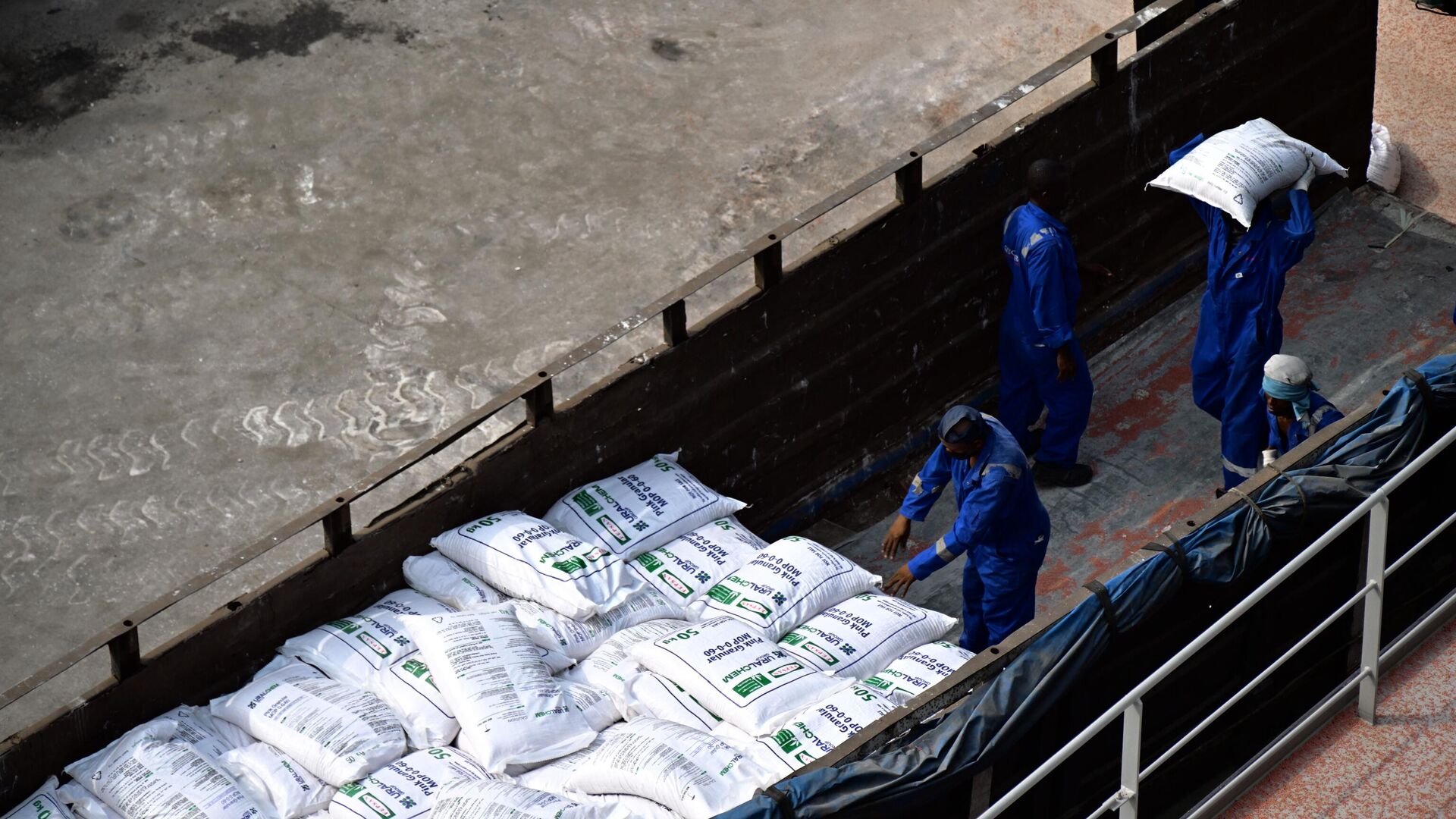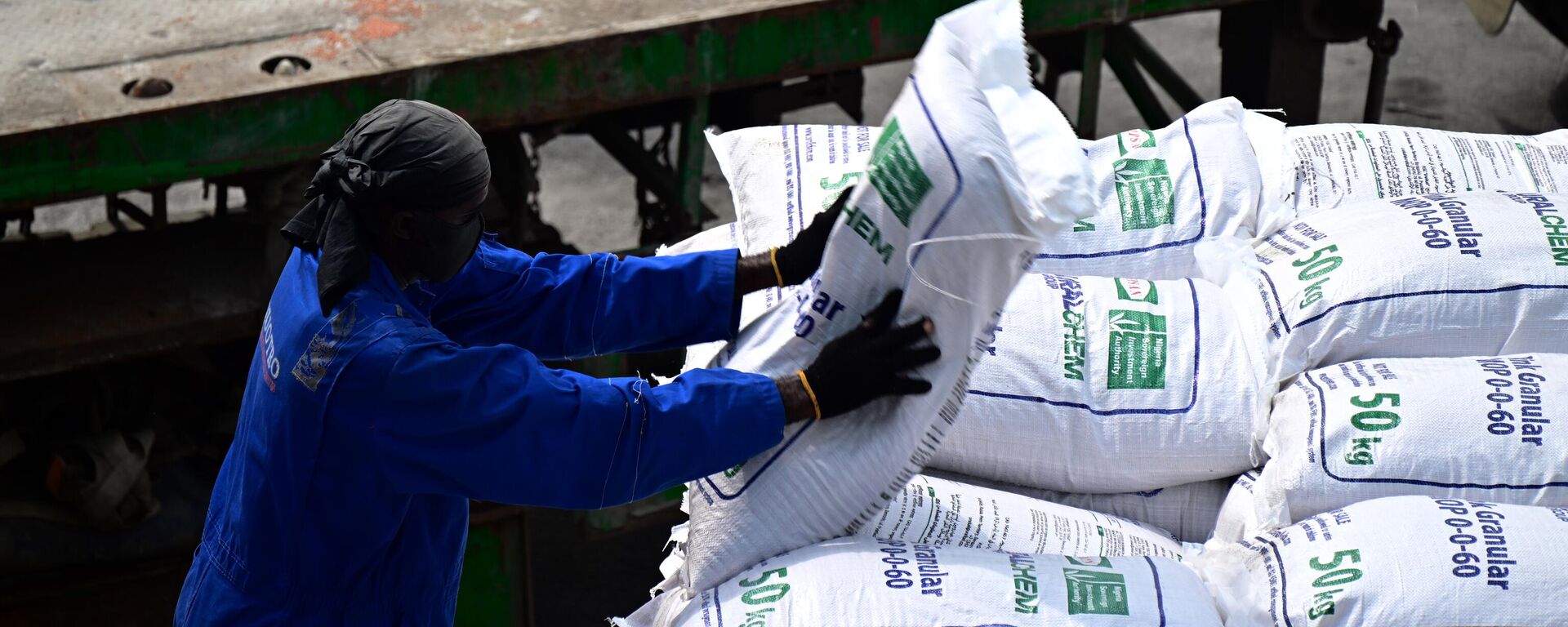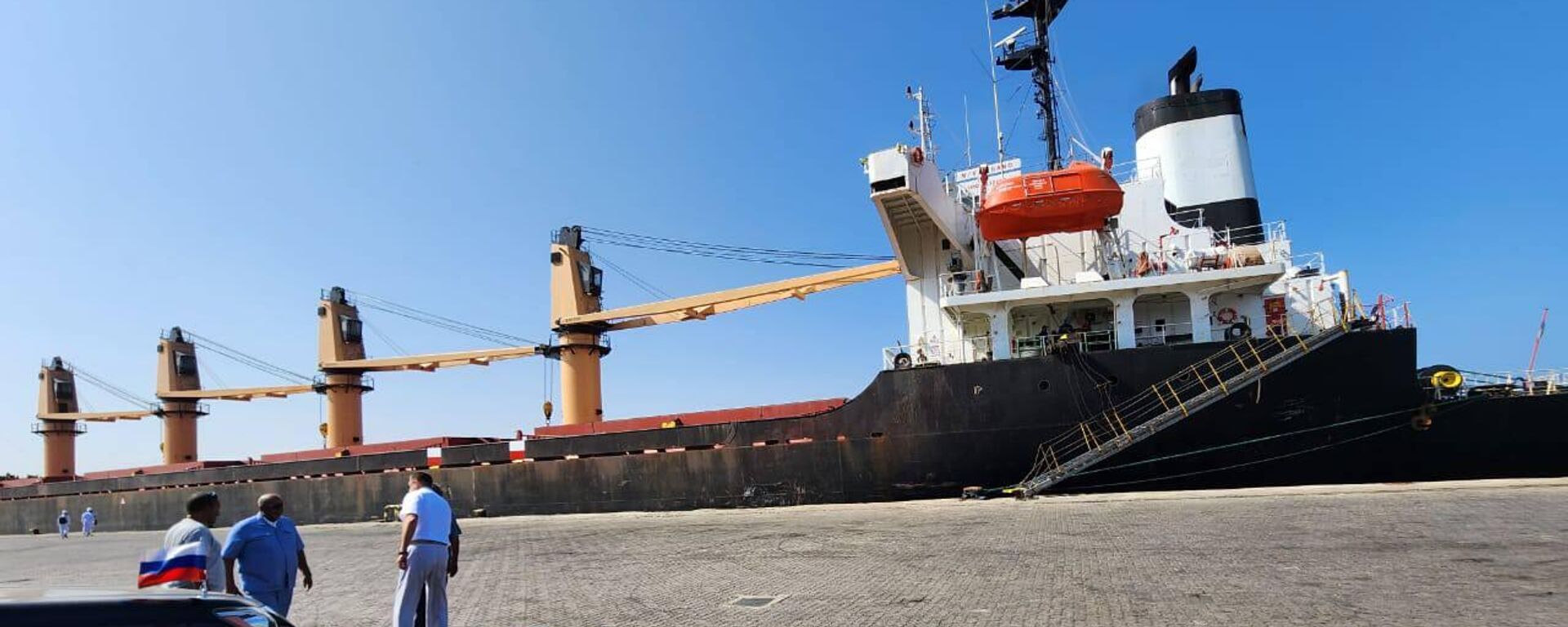https://en.sputniknews.africa/20240201/free-russian-fertilizer-to-boost-nigerias-agriculture-signifies-strengthening-ties-experts-1064868012.html
Free Russian Fertilizer to Boost Nigeria's Agriculture, Signifies Strengthening Ties: Experts
Free Russian Fertilizer to Boost Nigeria's Agriculture, Signifies Strengthening Ties: Experts
Sputnik Africa
In a recent development, Russia's Uralchem Group, one of the world's leading producers of mineral fertilizers, began unloading a large humanitarian cargo of... 01.02.2024, Sputnik Africa
2024-02-01T16:35+0100
2024-02-01T16:35+0100
2024-02-01T16:35+0100
russia-africa cooperation
nigeria
russia
sub-saharan africa
world food crisis
food security
grain
fertilizers
uralchem-uralkali group
agriculture
https://cdn1.img.sputniknews.africa/img/07e8/02/01/1064869346_0:320:3072:2048_1920x0_80_0_0_0977d4d87689a36ef4437d4aef208a0a.jpg
The free delivery of Russian fertilizer to Nigeria is of multiple significance and serves as a testament to the deepening bilateral relations between Moscow and Abuja, especially in the field of supporting socio-economic progress with a focus on agriculture, Felix Chinwe Asogwa, a professor of international relations at Enugu State University of Science and Technology, Nigeria, told Sputnik Africa in an interview.He highlighted the fundamental role of fertilizer in increasing agricultural production and addressed the persistent challenge of fertilizer scarcity, which has impeded the quest for heightened agricultural yields in Nigeria and several other African nations.For his part, Professor Emmanuel Remi Aiyede, an authority on political institutions, governance and public policy at the University of Ibadan, Nigeria, emphasized the key role of the Russian donation in addressing the perennial challenge of fertilizer scarcity, a critical impediment to Nigeria's agricultural productivity and food security.Aiyede emphasized the pivotal role of fertilizer as a basic input for agricultural production, particularly in the agriculturally vital northern regions of Nigeria.The professor also outlined the acute significance of this development, particularly in light of the Nigerian government's concerted efforts to actualize its commitment to reduce the cost of fertilizer by 50%, a commitment that holds great promise for the Nigerian agricultural sector and the farming community.Professor Asogwa delved into the complex dynamics underpinning the perception of the burgeoning Africa-Russia relations by the Western powers. He attributed the unease of the West concerning these developments to the lingering vestiges of the Cold War era, underscoring the legacy of superpower rivalry as a key factor.Moreover, in addressing the concerns about Western sanctions affecting Russia's capacity to supply vital agricultural resources, Prof. Asogwa acknowledged the concerns of Africans and their worries about the potential impact on sustainable agricultural development and food security on the African continent.The Nigerian scholar emphasized that the disruptions caused by these geopolitical hostilities pose a formidable threat to the agricultural stability and self-sufficiency of African nations, illustrating the need to insulate agricultural relations from the vulnerabilities of global geopolitical dynamics.In the same vein, and in the broader context of Russia's efforts to support agricultural livelihoods across the African continent, Professor Aiyede reflected on Moscow's pledge of 200,000 metric tonnes of grain to several African countries, praising this initiative as a laudable intervention of great significance.Moscow has promised to supply grain free of charge to six African countries in need. This decision was announced by Vladimir Putin at the second Russia-Africa summit held in St. Petersburg at the end of July 2023.The recipient countries are Burkina Faso, Somalia, the Central African Republic, Zimbabwe, Mali and Eritrea, some of which have already received the shipments. In total, Moscow plans to deliver up to 200,000 tonnes of grain to these countries. As for fertilizer supplies, the Uralchem Group is responsible for their transportation to the African continent. The cargoes were delivered to Malawi, Kenya, Zimbabwe and Nigeria. Uralchem plans to deliver a total of 300,000 tonnes.
https://en.sputniknews.africa/20240131/humanitarian-cargo-with-russian-fertilizers-arrives-in-nigeria-1064848416.html
https://en.sputniknews.africa/20240131/russia-fulfilled-its-obligations-on-grain-supplies-to-africa-in-shortest-possible-time-1064852114.html
nigeria
russia
Sputnik Africa
feedback@sputniknews.com
+74956456601
MIA „Rossiya Segodnya“
2024
Muhammad Nooh Osman
https://cdn1.img.sputniknews.africa/img/07e7/04/0a/1058467512_0:0:1280:1280_100x100_80_0_0_ec723833bcbfcaed2e21952965ad99e4.jpg
Muhammad Nooh Osman
https://cdn1.img.sputniknews.africa/img/07e7/04/0a/1058467512_0:0:1280:1280_100x100_80_0_0_ec723833bcbfcaed2e21952965ad99e4.jpg
News
en_EN
Sputnik Africa
feedback@sputniknews.com
+74956456601
MIA „Rossiya Segodnya“
Sputnik Africa
feedback@sputniknews.com
+74956456601
MIA „Rossiya Segodnya“
Muhammad Nooh Osman
https://cdn1.img.sputniknews.africa/img/07e7/04/0a/1058467512_0:0:1280:1280_100x100_80_0_0_ec723833bcbfcaed2e21952965ad99e4.jpg
russia-africa cooperation, nigeria, russia, world food crisis, food security , grain, fertilizers, uralchem-uralkali group, agriculture
russia-africa cooperation, nigeria, russia, world food crisis, food security , grain, fertilizers, uralchem-uralkali group, agriculture
Free Russian Fertilizer to Boost Nigeria's Agriculture, Signifies Strengthening Ties: Experts
Muhammad Nooh Osman
Writer/Editor
In a recent development, Russia's Uralchem Group, one of the world's leading producers of mineral fertilizers, began unloading a large humanitarian cargo of 34,000 tonnes of potash at the Nigerian port of Onne on Wednesday.
The free delivery of Russian
fertilizer to Nigeria is of multiple significance and serves as a testament to the deepening bilateral relations between Moscow and Abuja, especially in the field of supporting socio-economic progress with a focus on agriculture,
Felix Chinwe Asogwa, a professor of international relations at Enugu State University of Science and Technology, Nigeria, told
Sputnik Africa in an interview.
He highlighted the fundamental role of fertilizer in increasing agricultural production and addressed the persistent challenge of fertilizer scarcity, which has impeded the quest for heightened agricultural yields in Nigeria and several other African nations.
"The shipment will be of immense help to both Nigerian agriculture and the people in different ways. Fertilizer is a basic element in boosting agricultural productivity," prof. Asogwa said. "The inadequacy of fertilizer availability has remained the bane of enhanced agricultural yield in Nigeria and other African countries."
For his part, Professor Emmanuel Remi Aiyede, an authority on political institutions, governance and public policy at the University of Ibadan, Nigeria, emphasized the key role of the Russian donation in addressing the perennial challenge of fertilizer scarcity, a critical impediment to Nigeria's agricultural productivity and food security.
"I think it has a great significance. If you know that, fertilizer has always been a huge problem in Nigeria. It's always on the frontline of this question of food security," Prof. Aiyede told Sputnik Africa.
Aiyede emphasized the pivotal role of fertilizer as a basic input for agricultural production, particularly in the agriculturally vital northern regions of Nigeria.
"Even getting any input at all into agricultural production in those areas is very vital. You also know probably, a lot of people do, that local production of fertilizer has always been dependent on the importation from Russia. Now, you have this coming from Russia. So it's a big deal," said the University of Ibadan professor.
The professor also outlined the acute significance of this development, particularly in light of the Nigerian government's concerted efforts to actualize its commitment to reduce the cost of fertilizer by 50%, a commitment that holds great promise for the Nigerian agricultural sector and the farming community.
Professor Asogwa delved into the complex dynamics
underpinning the perception of the burgeoning Africa-Russia relations by the Western powers.
He attributed the unease of the West concerning these developments to the lingering vestiges of the Cold War era, underscoring the legacy of superpower rivalry as a key factor.
"Their [the West's] African relations have been dictated by exploitation and subjugation rather than mutuality, as Russia is currently advancing in their relations with African countries," said the Enugu State University professor.
Moreover, in addressing the concerns about Western sanctions affecting Russia's capacity to supply vital agricultural resources, Prof. Asogwa acknowledged the concerns of Africans and their worries about the potential impact on sustainable agricultural development and food security on the African continent.
The Nigerian scholar emphasized that the disruptions caused by these geopolitical hostilities pose a formidable threat to the agricultural stability and self-sufficiency of African nations, illustrating the need to insulate agricultural relations from the vulnerabilities of global geopolitical dynamics.
In the same vein, and in the broader context of Russia's
efforts to support agricultural livelihoods across the African continent, Professor Aiyede reflected on Moscow's pledge of 200,000 metric tonnes of
grain to several African countries, praising this initiative as a laudable intervention of great significance.
"I think it's a welcome initiative because poverty is high in many countries in Africa," Aiyede stated. "What it then means is that it is likely to attract more sympathy to Russia as a country that cares about poverty and hunger in Africa."
Moscow has promised to supply grain free of charge to six African countries in need. This decision was announced by Vladimir Putin at the second Russia-Africa summit held in St. Petersburg at the end of July 2023.
The
recipient countries are Burkina Faso, Somalia, the Central African Republic, Zimbabwe, Mali and Eritrea, some of which have already received the shipments. In total, Moscow plans to deliver up to 200,000 tonnes of grain to these countries.
As for fertilizer supplies, the Uralchem Group is responsible for their transportation to the African continent. The cargoes were delivered to Malawi, Kenya, Zimbabwe and Nigeria. Uralchem plans to deliver a total of 300,000 tonnes.




